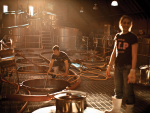The Health and Safety Reform Bill got lots of media coverage about what does, and does not, constitute a high-risk industry.
Because most farming falls on the low-risk side, many people seem to have rushed to a judgement that farmers are excluded from these reforms. This is simply not the case.
The reforms are designed to improve the safety of every industry and workplace – including farms.
Also, the bill passed by Parliament is welcomed by Federated Farmers as further help to our members to address the high level of workplace incidents and fatalities on farms.
Farmers know their performance is not good enough. They and Federated Farmers accept there is a problem, and the changes being brought about by the Health & Safety Reform Bill will continue to address this.
Federated Farmers’ focus to date has been on gaining acceptance by the sector of its poor track record and raising awareness of the key risks on New Zealand farms. We find it very effective to discuss the circumstances and causes of safety mishaps in the sector.
And we have teamed up with WorkSafeNZ and industry associations to identify and share best practice safety management.
Most farming activities fall outside the classification of high risk, so such businesses do not need an employee safety representative if they have fewer than 20 employees. But this does not mean the reform bill will not force further changes on farms. Its reforms are much broader than that.
This legislation is intended to support all industries to provide a safer environment for all workers. It strengthens the current regulatory framework in a number of ways and will incentivise everyone able to bring influence to bear on farmers over the risks faced by workers.
For farmers, that means a legal obligation to manage the risks within their control for all contractors and staff. The application of legal duties has also been expanded to include any person who holds a governance position in a business -- a partner, trustee or director. In many cases that will mean farmers’ family members, and farm owners.
All this is backed by much higher maximum fines and strengthened regulatory oversight, whether you’re working in a high-risk industry or not.
These are not small or insignificant implications for farmers, nor are they the only things being done to make farms safer.
• Katie Milne is Federated Farmers board member.


















